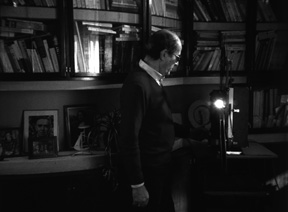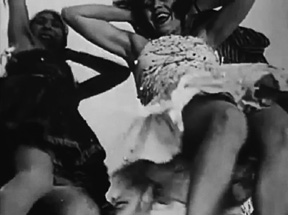YIDFF 2015 Opening Film
Visit or Memories and Confessions
Visita ou Memórias e Confissões PORTGUAL / 1982 / Portuguese / Color / 35mm / 68 min
PORTGUAL / 1982 / Portuguese / Color / 35mm / 68 min
Director, Script: Manoel de Oliveira
Director of Photography: Elso Roque
Camera: Alexandre Santos, Emílio Castro, Mário de Oliveira
Editing: Manoel de Oliveira, Ana Luísa Guimarães
Sound: Joaquim Pinto, Vasco Pimentel
Music: Ludwig van Beethoven, “Piano Concerto no.4”
Continuity: Júlia Buísel
Mixing: Jean-Paul Loublier
Voices: Teresa Madruga, Diogo Dória
Dialog: Agustina Bessa Luís
Decor: Maria Isabel de Oliveira, Manuel Casimiro
Cast: Manoel de Oliveira, Maria Isabel de Oliveira, Urbano Tavares Rodrigues
Supported by: Ministério da Cultura, Instituto Português de Cinema
Production Assistant: José Manuel
Director of Production: Manuel Guanilho
Production Company: Cineastas Associados
Source: Cinemateca Portguesa
“The cinema is not art. The cinema is not life. The cinema is something between art and life.”
Oliveira completed this autobiographical film in 1982, after filmmaking debts forced him to give up his Porto home of many years. Following production, Oliveira entrusted the film to the Cinemateca Portuguesa with instructions that it be shown after his death. In May of 2015 the film was screened in Oliveira’s hometown of Porto, and received its international premiere at the Cannes Film Festival.
This film spans the forty-year period following the 1942 building of his house, with Oliveira tracing the path of his own family and a life passionately devoted to the cinema. Against the inviting backdrop of Agustina Bessa Luís’s words and Beethoven’s Piano Concerto no.4 the film pieces together Oliveira’s own cinematic world.
For this screening we wish to extend our thanks to the director’s family, as well as to Mr. José Manuel Costa, director of the Cinemateca Portuguesa, and to the Portuguese Embassy. This film is dedicated to Oliveira’s wife, Maria Isabel.
 Nice, à propos de Jean Vigo
Nice, à propos de Jean Vigo
- FRANCE / 1983 / French, Portuguese / Color, B&W / Digital BETACAM (Original: 16mm) / 58 min
Director: Manoel de Oliveira
Assistant Director: François Eder
Photography: Jacques Boquin
Editing: Janine Verneau, Fronçoise Besnier
Sound: Jean-Paul Mugel
Lighting: Claude Pezet
Producer: Yves Valero
Production Company, Source: Institut National de l’Audiovisuel (INA)
Produced as one installment in the French National Audiovisual Institute (INA) television series “Un Regard Étranger sur la France,” this film depicts the town of Nice, where Oliveira’s son, the painter Manuel Casimiro, resided at the time. The film focuses on the contrast between the city’s status as a tourist destination represented by gambling and beaches on one hand, and its history and cultural heritage on the other, perhaps aiming to draw out a style and spirit common to both that transcends constraints of time period. Oliveira’s film echoes Jean Vigo’s black and white A propos de Nice (1930).
Born in Portugal’s second-largest city, Porto, in 1908. After dropping out of university, he appeared as an extra in a film in the 1920s. In 1931, he made his directorial debut, the silent short documentary Douro, Fauna Fluvial, at age 23. He directed his first full-length feature, Aniki-Bóbó in 1942. Into the 1960s he struggled to produce films under the dictatorship of the Salazar regime, and took up farming while concentrating his filmmaking work on making shorts. After Salazar’s death, in the 1970s his work began to receive acclaim throughout Europe, and from the 1980s onward he released roughly one film per year. In 1985 the Venice International Film Festival screened his 410-minute epic The Satin Slipper, also presenting him with the Golden Lion Award for Lifetime Achievement, and in 1991, Divine Comedy received the Special Jury Prize. Among other films he would make The Convent (1995) starring Catherine Deneuve and John Malkovich, and Voyage to the Beginning of the World (1997), the last film of great Italian actor Marcello Mastroianni, and his work even found distribution in Japan. He came to Japan in 2003 to participate in Ozu 2003, a symposium marking the 100th anniversary of Ozu Yasujiro’s birth. The Letter (1999) took the Cannes Film Festival Jury Prize, and in 2008 the festival awarded him an honorary Palme d’Or. Even past the age of 100, he continued working, directing Eccentricities of a Blonde-haired Girl (2009), The Strange Case of Angelica (2010), and Gebo and the Shadow (2012). Upon his death on April 2nd, 2015, he was well known as the oldest director in the world. His last works, in 2014, were his trailer for the Vienna International Film Festival, entitled The Fountain of Virtues; and the short The Old Man of Belem, which screened at the Venice International Film Festival.
